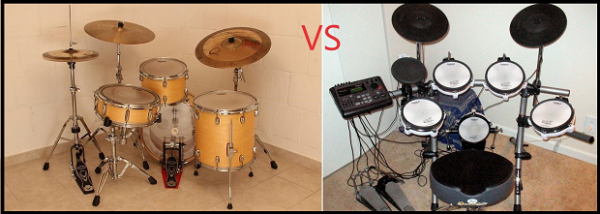
Electronic drums are no more exotic: now they are instruments in their own right. Being modern and compatible with the most up-to-date technologies, they are an attractive alternative to traditional rock drum sets. Thus, choosing becomes a conun-drum.
If briefly, both options have their pros and cons. The choice depends on what you’ll use these drums for. Let’s take a glance at both sides with the expert help from simplydrum.com
The Power of Electronic Drums
The idea of electronic drums is that they reproduce sounds rather than produce, the stick being a trigger rather than an actual effector. So you don’t beat the sound out of them: you make them play small one shot records, like a DJ. Yet it takes the musician’s approach because you need the same motor skills as the acoustic drummer.
What are electronic drums better for?
- Training. Being acoustically quiet, an electronic drum set can be installed in a regular apartment, and you will not disturb your neighbors (unless you connect a powerful speaker to it). In addition, an electronic set requires less space.
- Recording. If you want the drums on your track to sound live, with all the offbeats and freestyled solos, electronic drums are the best of both worlds. They are easy to MIDIfy, and they let you show your real manner, instead of positioning drum sounds on the piano roll.
- Changing sounds. If you have the required sample libraries, you can imitate sounds of various drum sets with just one you own.
Acoustic Drums: Old School Stays Cool
As for the good old acoustic drum set, it still has its undeniable pros. I’d opt for nothing but acoustic drums in situations like these:
- Learning to play drums. You can start with a special training drum set and then switch to a pro set. Anyway, it will teach you the motor skill a real drummer needs. Even if later you switch to electronic drums, your experience with real ones can’t be overrated.
- Real gigs. Unless it’s a purely electronic, DJ-oriented event, or you play very synthetic music, real acoustic drums are unbeatable.
- Recording raw live sound. No matter how great the samples are, they cannot replace the here-and-now beating these sounds out of bass drums, snares, hats, or toms. An experienced drummer can get the sound they want by adjusting both drums and hardware and the manner of playing.
- No need for electricity. Electronic drums need to be powered. Acoustic ones can be played even if the stage is literally unplugged.
Is it better to learn drums on an electronic kit or acoustic?
It doesn’t matter if you use an electronic drum kit or a regular one, it’s all about how much time and effort you put into learning.
There are a lot of electronic drums out there, but I’ve found that they’re not as responsive or realistic as acoustic drums. With an acoustic kit, you can feel the vibrations through your hands so it’s really important to have one with good quality wood.
When it comes to learning drums at home, electronic kits are the best way to go because they’re cheaper than acoustic ones. You’ll also have less noise issues!
Choose Your Weapon, Drummer!
It’s not that acoustic drums are a must for gigs, and electronic ones are a studio thing. Maybe every single event will make you hesitate about which to choose if your music is on that narrow margin. Still, if you are just entering the world of drumming, these recommendations may be helpful.
Have you ever compared acoustic and electronic drums? How does it feel to play one after another? Which do you prefer? Which reasons would you add? Drop a line in comments with a bang!





